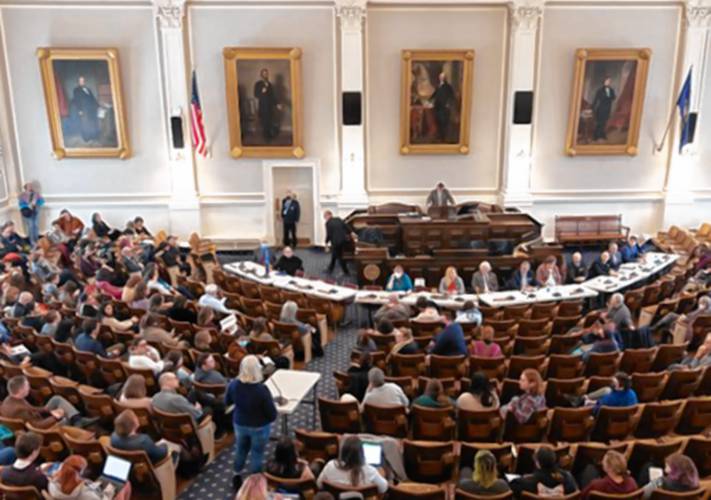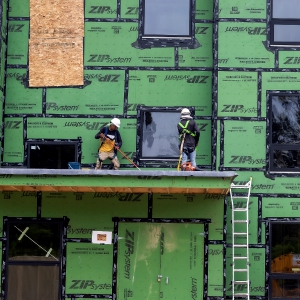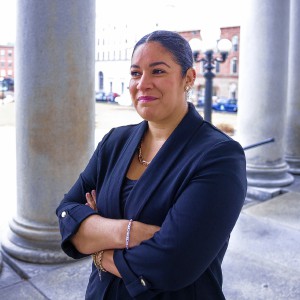The N.H. Senate is considering a bill to ban gender-affirming surgeries on minors. Hospitals statewide say they don't perform these procedures.

New Hampshire residents gather to testify on House Bill 619 at the Statehouse in Concord last March. An amended version of the bill, which passed the house last month, would ban gender-affirming surgeries for minors, but no New Hampshire hospitals have said they currently provide such procedures. Hannah Schroeder—Keene Sentinel staff photo
| Published: 04-23-2024 10:24 AM |
A bill that would ban gender-affirming surgery for minors in New Hampshire will have a public hearing before the state Senate Judiciary Committee on Thursday.
But representatives from a dozen hospital systems statewide say they don’t perform this type of procedure.
“We do not currently perform gender-affirming surgical procedures and have never performed any gender-affirming surgeries in the past,” Alycia McDuff, a spokesperson for Monadnock Community Hospital in Peterborough, said in an email.
As introduced last legislative session, House Bill 619 would have barred people under 18 from gender-affirming care and banned the affirmation of and education on LGBTQ+ identities in New Hampshire public schools.
Gender-affirming health care supports someone’s perception of their gender identity through a range of social, psychological, behavioral and medical interventions, according to the World Health Organization. This can range from using someone’s preferred name and attending mental health support groups to accessing hormone replacement therapy.
The New Hampshire bill was subject to more than 2,000 online testimonies and a packed public hearing that lasted more than five hours last March.
In early January, the N.H. House passed an amended version of the bill, which narrowed its focus to banning “genital gender reassignment surgery” for minors. The bill is scheduled for a public hearing before the N.H. Senate Judiciary Committee at 9:15 a.m. on Thursday in Room 100 at the Statehouse in Concord.
The measure — along with several others introduced this legislative session in both the N.H. House and Senate — mirrors some of the hundreds that have been introduced primarily by Republican legislators across the country since 2021 that seek to restrict the rights of transgender and gender-diverse people.
Article continues after...
Yesterday's Most Read Articles
 Concord may finally buy long-closed rail line with hopes of creating city-spanning trail
Concord may finally buy long-closed rail line with hopes of creating city-spanning trail
 New Cheers owners honor restaurant’s original menu while building something fresh
New Cheers owners honor restaurant’s original menu while building something fresh
 A look ahead at the ‘preferred design’ for Concord’s new police headquarters
A look ahead at the ‘preferred design’ for Concord’s new police headquarters
 New Hampshire targets sexual exploitation and human trafficking inside massage parlors
New Hampshire targets sexual exploitation and human trafficking inside massage parlors
 State rules Epsom must pay open-enrollment tuition to other school districts, despite its refraining from the program
State rules Epsom must pay open-enrollment tuition to other school districts, despite its refraining from the program
Supporters of HB 619 have claimed minors could be receiving genital gender-affirming surgery in the Granite State. And while bill opponents argue these procedures are medically necessary in rare cases, proponents voice concern about the lifelong impact.
The Sentinel contacted 14 hospital systems statewide (comprising 27 total facilities) for this story, and of the 13 that responded, none have performed this procedure on minors for reasons that include a shortage of specialists to a lack of demonstrated need for the procedure.
“Huggins Hospital is a small, rural hospital and — while we provide many services to our community — these procedures are complex and often require specialty surgeons, providers and support services not available in our area,” Monika O’Clair, chief strategy officer at the Wolfeboro hospital, said in an email. “While we don’t provide the surgeries, we do provide gender-affirming care to anyone in need.”
A spokesperson for Exeter Hospital deferred to the New Hampshire Hospital Association for comment.
"NHHA does not collect this information from the hospitals, so we do not have any information in this regard," said Tammy Boucher, the association's director of communications.
Dartmouth Hitchcock Medical Center in Lebanon, the largest hospital in the state, does not perform gender-affirming surgeries on minors.
“Parents and families should have the right to access healthcare for their children in consultation with physicians and other trusted healthcare professionals,” Dr. Keith Loud, Dartmouth Health Children’s physician-in-chief and chair of pediatrics, said in a written statement. “While Dartmouth Health does not perform gender-affirming surgery on minors, we are concerned that the passage of HB 619 directly impedes equitable access to medical care for youth in New Hampshire.”
Nearly two-thirds of transgender and nonbinary youth using gender-affirming hormones are somewhat or very concerned about losing access to this type of care, according to a 2023 survey by the Trevor Project, a national nonprofit that focuses on suicide prevention and crisis intervention in LGBTQ+ youth.
All but two of the medical centers that responded to The Sentinel — Elliot Hospital in Manchester and Dartmouth Hitchcock — have never provided any form of gender-affirming surgical care, which can also include chest masculinization or feminization (otherwise known as top surgery) and facial feminization surgery.
Elliot Hospital and Dartmouth Hitchcock perform gender-affirming surgeries only on people ages 18 and older. Elliot provides gender-affirming top surgery for adults only, according to its website.
Cheshire Medical Center in Keene does not provide any gender-affirming surgeries, a spokesperson said.
Rep. Erica Layon, the prime sponsor of the amendment to HB 619, said she still believes the measure is necessary because not enough is known about the effects of gender-affirming surgeries on minors.
“Teenagers are not small adults, and a teenager who has undergone years of hormonal treatment does not have the same physiologic development as people who begin their transition later in life,” the Derry Republican said in a written statement Thursday. She drew a distinction between these procedures on youth and surgeries with a longer track record.
“This bill hits pause on these procedures in the state so as to await data to ensure that these procedures have at least the same success rate for youth as they do in the better studied adult population who experienced physiologic puberty,” Layon said.
Many physicians in New Hampshire, though, say the legislation would infringe on the rights of transgender children and their families, potentially opening the door for further restrictions on access to gender-affirming health care for youth.
HB 619 includes exceptions for pediatric genital surgeries “to correct malformation, malignancy, injury or physical disease,” circumcision and for people born intersex.
Intersex is an umbrella term used to describe a person whose body is not definitively male or female because of chromosomal, reproductive or genital variations. Approximately 1.7 percent of people in the world are intersex, according to the Office of the United Nations High Commissioner for Human Rights.
Surgeries on intersex children have been condemned by the U.N., the Human Rights Campaign and intersex activists around the world as nonconsensual and not medically necessary for these children. However, the U.S. government has left it up to individual states to determine who can access gender-affirming care and when.
If HB 619 were to pass through the N.H. Senate and become law, providers in the state say it could hinder efforts for incorporating other gender-affirming health care into more holistic and inclusive primary care practice.
According to the online Trans Legislation Tracker, 104 bills aiming to deny access to gender-affirming health care have been introduced across this country this year. Four of them, including HB 619, are in New Hampshire.
“Gender-affirming care can, and should, be provided by all practitioners who come in contact with an individual who wants and needs this care ...” said Dr. Deborah Mueller, a gynecologist at Huggins Hospital. “By affirming their self-image, identification, beliefs and values, we are providing compassionate and appropriate medical care.”







 New Hampshire school phone ban could be among strictest in the country
New Hampshire school phone ban could be among strictest in the country Concord became a Housing Champion. Now, state lawmakers could eliminate the funding.
Concord became a Housing Champion. Now, state lawmakers could eliminate the funding. ‘A wild accusation’: House votes to nix Child Advocate after Rep. suggests legislative interference
‘A wild accusation’: House votes to nix Child Advocate after Rep. suggests legislative interference  Sununu decides he won’t run for Senate despite praise from Trump
Sununu decides he won’t run for Senate despite praise from Trump
